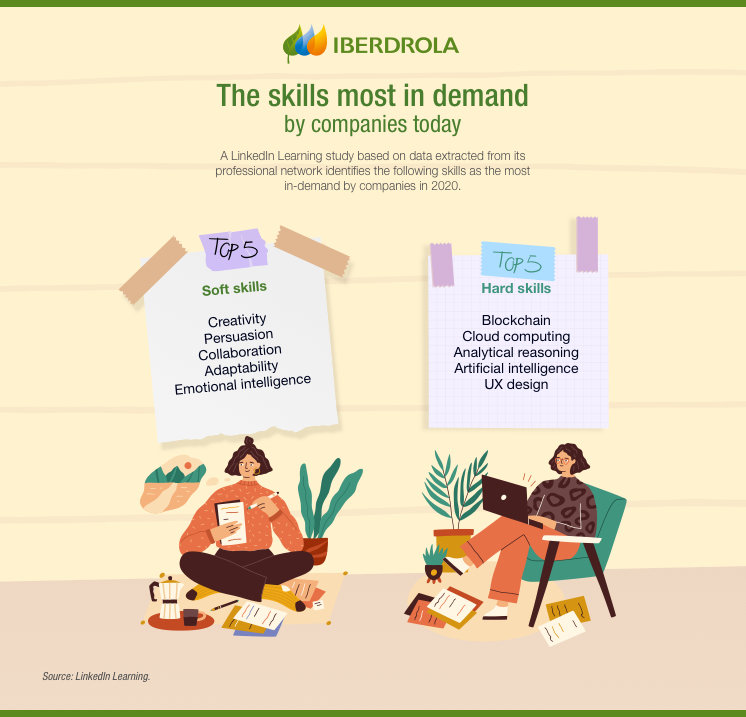Soft skills
The value of soft skills in today's labour market
Soft skills comprise a set of social competences that make it easier for people to relate to their peers. Although they are closely linked to one's own personality, they can be improved and, despite their intangible nature, they are highly valued by companies today. They include emotional intelligence, change management and critical thinking.

In today's labour market, the rise of digital profiles is a fact. The more and better technical competences one possesses, also known as hard skills, the better the chances of finding a job. However, in parallel to this trend, companies' human resources departments are looking for more than just formal knowledge, they are looking for soft skills that are not reflected in CVs.
What are soft skills
Soft skills refer to those personal and social competencies that facilitate human relations and allow people to successfully perform in any area of life, including the workplace. We are talking about skills related to emotional intelligence, critical thinking, leadership, resilience and change management, among others that we will see in detail below, which are key to professional development and growth in companies.
Although the consideration of soft skills as a competitive advantage and differentiating factor in companies is a recent phenomenon, its origin dates back to the 1970s and is confined to the military. It was the US Army that first used the term when it realised that its best troops were not the most skilled with machinery, but those with the most developed transversal skills, such as responsibility, conflict resolution or teamwork. These qualities were given their name as opposed to hard skills, i.e. purely technical knowledge.
The importance of soft skills
For many human resources experts, soft skills will be as important as hard skills when it comes to facing the challenges of a future marked by new technologies. People with these skills contribute to improving well-being within companies, providing, among other things, optimism, motivation, communication and empathy, which translates into greater productivity and results. Such is their importance that almost all online learning platforms, such as Udemy, offer courses to develop these skills. Although they are largely intrinsic to the personality, specialists agree that they can be worked on and improved.
"Soft skills will play a key role both for those looking for a new job and for those who want to go further in their career and continue to grow"
Llibert Argerich, vicepresident of Marketing at Udemy
Just two years ago, the multinational IBM conducted a study among 5,800 executives in 50 countries to find out what skills business leaders would need in the coming years, and the conclusion was that these would have less to do with technological training and more to do with soft skills. Based on this study, talent management expert Josh Bersin External link, opens in new window., a new window, pointed out the difficulty of finding people with soft skills: "More than 45% of human resources managers say that university graduates leave with the necessary digital skills, but without those focused on problem solving, teamwork or leadership".
External link, opens in new window., a new window, pointed out the difficulty of finding people with soft skills: "More than 45% of human resources managers say that university graduates leave with the necessary digital skills, but without those focused on problem solving, teamwork or leadership".

Examples of soft skills
Soft skills comprise a wide variety of abilities. We have a couple more to add to the ones in the infographic:
Time management
Effective time management boosts personal and collective productivity, and is therefore one of the most valued skills today.
Critical thinking
The ability to analyse and evaluate the consistency of arguments, discerning between the brilliant and the mediocre, raises the quality of the work.
Stress management
The mental health of employees is becoming an increasing concern for companies, as high levels of stress cost billions a year.
Communication skills
Verbal, non-verbal and written communication are vital, especially in environments where different cultures and generations coexist. This is also where storytelling skills come in.
Change management
In a working environment marked by the continuous evolution of technology, a good attitude towards change ensures the success of transformation processes.
Leadership
This attribute is crucial to getting the best from teams, making them believe in a project and keeping them motivated. The transformational is now more highly valued.
Resilience
The ability to face adversity and emerge stronger, displaying great perseverance, is key to the success of troublesome projects.




